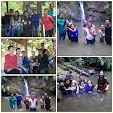Morpheme
A morpheme is the smallest unit of language that has its own meaning. All morphemes bear a
meaning. Roll your mouse over the words below to see how many morphemes there are.
Example :
- Read (Read) - Redo (Re+do) - Culture (Culture)
- Unexpectedly (Un+expect+ed+ly) - Storehouse (Store+house) - Footballer (Foot+ball+er)
Morpheme is "a minimal unit of meaning or grammatical function". Units of grammatical function include forms used to indicate past tense or plural. (Yule,George.63:2006.The Study Of Language-Third Edn.Cambridge University Press.)
Free Morpheme and Bound Morpheme
Free Morpheme -> Morphemes that can stand by themselves as single words.
Eq. Open, Tour, Book, etc.
Bound Morphem -> Which are those forms that cannot normally stand alone and are typically attached to another form, exemplified as re-, -ist, -ed, -s.
Eq. Undressed Carelessness
Un- dress -ed Care -less -ness
prefix stem suffix stem suffix suffix
(bound) (free) (bound) (free) (bound) (bound)
(Yule,George.63:2006.The Study Of Language-Third Edn.Cambridge University Press.)
Free Morpheme and Bound Morpheme
Morphemes that can stand alone to function as words are called free
morphemes. They comprise simple words (i.e. words made up of one free
morpheme) and compound words (i.e. words made up of two free morphemes).
Examples:
Simple words: the, run, on, well
Compound words: keyboard, greenhouse, bloodshed, smartphone
Morphemes that can only be attached to another part of a word (cannot stand alone) are called bound morphemes.
Examples:
pre-, dis-, in-, un-, -ful, -able, -ment, -ly, -ise
pretest, discontent, intolerable, receive
Complex words are words that are made up of both free morpheme(s) and bound morpheme(s), or two or more bound morphemes.
Roll your mouse over the words below to see how many morphemes are there and whether they are free morphemes or bound morphemes.








0 komentar:
Posting Komentar